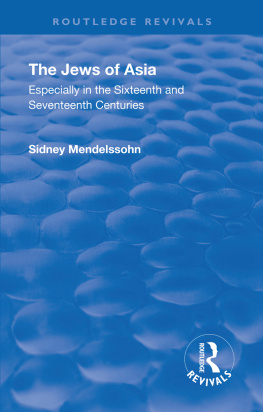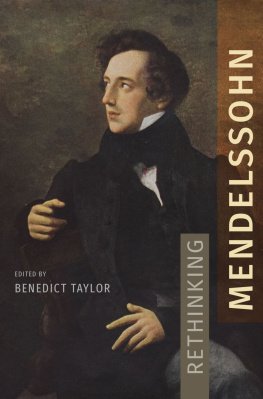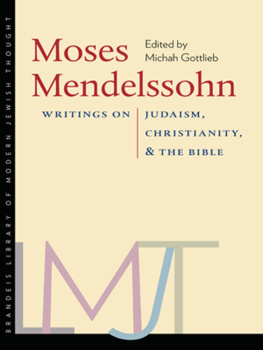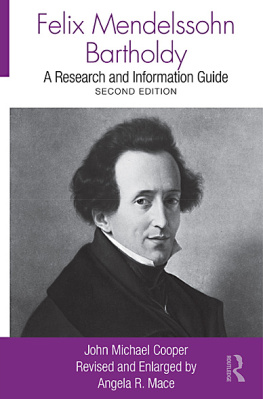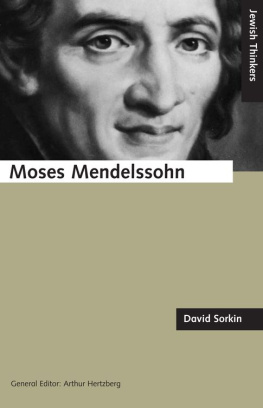FROM NEW YORK TO SAN FRANCISCO
FROM NEW YORK TO SAN FRANCISCO
Travel Sketches from the Year 1869
ERNST MENDELSSOHN-BARTHOLDY
Translated by BARBARA H. THIEM
Edited by GERTRUD GRAUBART CHAMPE
German edition by KARIN BRGER AND SEBASTIAN PANWITZ
INDIANA UNIVERSITY PRESS
This book is a publication of
Indiana University Press
Office of Scholarly Publishing
Herman B Wells Library 350
1320 East 10th Street
Bloomington, Indiana 47405 USA
iupress.indiana.edu
2017 by Indiana University Press
All rights reserved
No part of this book may be reproduced or utilized in any form or by any means, electronic or mechanical, including photocopying and recording, or by any information storage and retrieval system, without permission in writing from the publisher. The Association of American University Presses Resolution on Permissions constitutes the only exception to this prohibition.
The paper used in this publication meets the minimum requirements of the American National Standard for Information SciencesPermanence of Paper for Printed Library Materials, ANSI Z39.48-1992.
Manufactured in the United States of America
Library of Congress Cataloging-in-Publication Data
Names: Mendelssohn-Bartholdy, Ernst von, 18461909, author. | Champe, Gertrud Graubart, editor. | Burger, Karin, editor. | Panwitz, Sebastian, editor.
Title: From New York to San Francisco : travel sketches from the year 1869 / Ernst Mendelssohn-Bartholdy; translated by Barbara H. Thiem; edited by Gertrud Graubart Champe; German edition by Karin Burger and Sebastian Panwitz.
Other titles: Von New York nach San Francisco. English
Description: 1st edition. | Bloomington, Indiana : Indiana University Press, [2017] | Includes bibliographical references.
Identifiers: LCCN 2017025699 (print) | LCCN 2017019271 (ebook) | ISBN 9780253031228 (ebook) | ISBN 9780253026316 (cloth : alk. paper)
Subjects: LCSH: United StatesDescription and travel. | Mendelssohn-Bartholdy, Ernst von, 18461909Correspondence. | United StatesSocial life and customs19th century. | Railroad travelUnited States. | Travelers writings, German.
Classification: LCC E168 (print) | LCC E168 .M53513 2017 (ebook) | DDC 917.304/09034dc23
LC record available at https://lccn.loc.gov/2017025699
1 2 3 4 5 22 21 20 19 18 17
CONTENTS
TRANSLATORS NOTE
WHEN I CAME ACROSS the original private publication of these letters a few years ago, I was fascinated by the many aspects of American life in 1869 that are vividly reported. As one of the Mendelssohn family, I initially intended to translate this book for the many members of the clan who now live in this country and no longer speak German. However, I came to believe that these pages would be of interest to a larger public because they illustrate the vantage point of an educated European who spouts Latin quotations (for better or worse) and compares his experiences to his travels in Europe.
My thanks go to Gertrud Champe, who spent many hours making this translation idiomatic and flowing, and Jon Thiem, who helped us with his knowledge of the literature on the Mendelssohns and who was the first to discover the original book, as it was published privately in the nineteenth century.
Barbara H. Thiem
FROM NEW YORK TO SAN FRANCISCO
Introduction
LETTERS PROVIDE a rich and lively approach to cultural history; if the writing is sharply observant, they teach us a great deal about the time and place the writer is describing, no matter why the letters were written. Even as strangers, reading the letters long after they were written, we can let our imagination play among the cameos of the later-nineteenth-century United States that the present collection offers. The letters were composed in 1869, a time when the center of the country was moving westward after the end of the Civil War. In small settlements and large towns, people were building, for good and for ill, bringing with them elements of European civilization that ranged from newspapers to concerts of both European and American music, from city planning to the formation of communities based on faith. And for added divergence from what had been there, unalloyed for millennia, there was even a bit of authentic Chinese theater on the western shore.
The vast expanse of land was beginning to think of itself as one country. Financiers and industrialists had devoted imagination and funds to the construction of a continent-spanning railroad whose two arms, the Union Pacific and the Central Pacific, met and joined at Promontory, Utah, in May 1869. In many cities, black men and women were doing for pay what they had so recently done under duress. It was a time of ferment.
Into this bustling world came two privileged young Prussian men on holiday, Ernst Mendelssohn-Bartholdy and his older cousin Ernst Westphal, both members of the Mendelssohn family of Berlin. Over a period of three months, they traveled across the United States and back again by train. During this time, no matter where they were, they sent word of their travels back home, enthusiastic about the sights and adventures they encountered and firmly convinced of their opinions about the way Americans conducted their affairs. Encountering their reports today provides a bittersweet opportunity to see ourselves as others saw us then.
All the letters in this collection are written by Ernst Mendelssohn-Bartholdy. Ernst Westphal is not necessarily a lesser personality, but as his cousin points out in one letter, he just doesnt like to write. His presence, however, must certainly have added to the pleasure and adventure of the excursion.
Mendelssohn-Bartholdys early letters from New York are a colorful mixture of praise and criticism. Everything is exoticthe size, the noise, the banana he had for dessert, the beauty and freedom of the young women he sees (not that he enjoys the apparently subservient position into which these beauties put the men). And he is quick to praise the things he finds better in New York than in Berlin, like the general availability of streetcars, but he is quite ready to give the rough side of his tongue to whatever he finds distasteful, inappropriate, or even just unfamiliar.
Far from being an egalitarian, Ernst has an unfriendly or sarcastic word for any instance of people who think they are as good as anybody else. He pounces with a grin on a corrupt customs official:
The customs officer who was inspecting my suitcase stood there comfortably, opening his hand behind his back saying: You shant have any trouble, Sir! which I answered silently but pleasantly with a few dollars. The noble republican immediately signed my luggage with chalk, meaning that the bags were properly fixed.
Nor does Ernst spare his cousin a few gibes when he refuses to use the same expedient to shorten their time of dealing with authority. Westphal, servant of the law, will not resort to bribery.
But for all his sniping at servants who dont serve, at riffraff with no manners, at the exaggerated elegance of womens clothes, Ernst has a certain sensitivity for the allure of New York, which was already a great world city:



